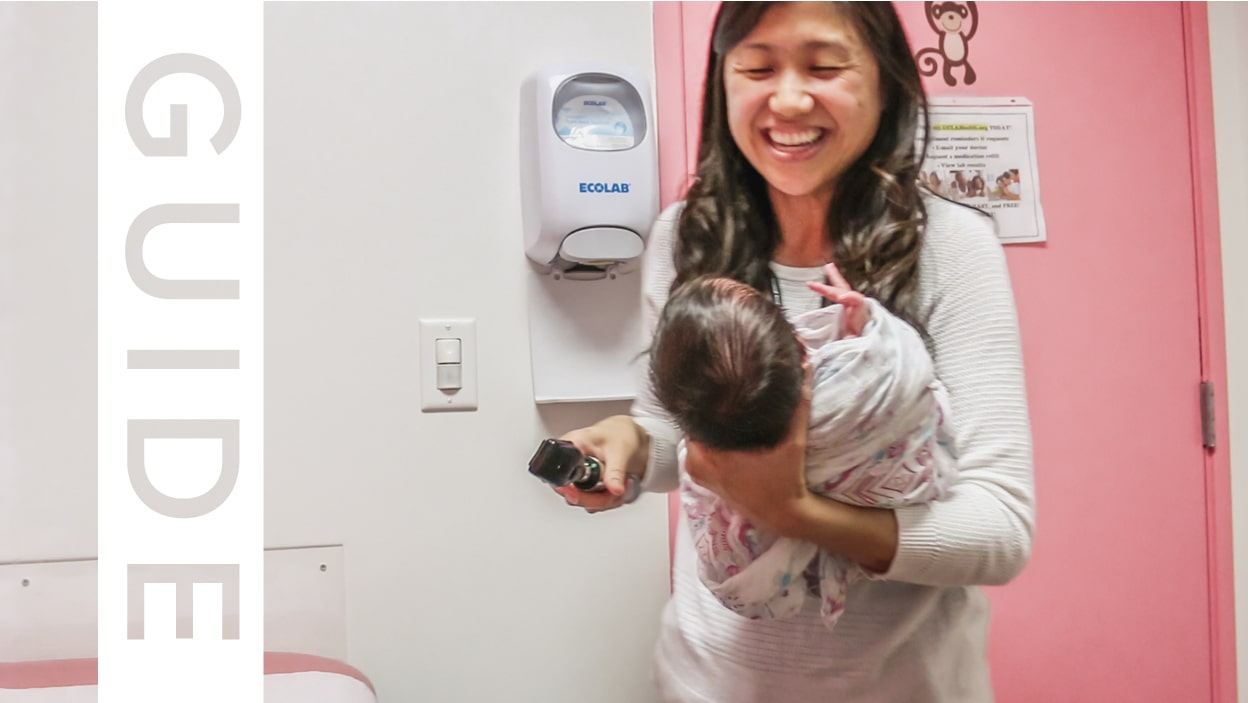

Listen, baby is pretty gloriously low maintenance now, all cozied up inside you, but you do realize that eventually she’s going to be out in the world – and after she meets her parents, one of the first friendly faces she’ll see is that of her new pediatrician. Here are some tips for finding a pediatrican who you like (and maybe even the pediatrician of your dreams?) and who will, ideally, be a trusted resource for your family for years to come.
When should you start looking?
Why not start the process during your second trimester when you’re feeling like a million bucks? Upsides: you have energy, and there’s still enough time to fully change course in case you need to.
But first, envision the result
Not to be too woo-woo about it, but before you get into the nitty gritty, it’s worth stepping back to ask yourself what you want. Like, really ask yourself what is important to you and your family. Maybe you know you need to work with someone open to some non-Western medicine practices, for example, or someone who firmly is or isn’t open to flexibility around vaccine schedules. For some people, it’s important that their ped be a parent. Some want to work with a woman. Others, a man. Do you like the idea of working with someone early in their career (who may be more progressive), or have you actually always pictured a grandfatherly type with decades of experience? Take a sec to check in with yourself because the more you know what you’re seeking, the more likely you are to find it.

Gather a list
Get recs from like-minded friends and your OB, if you like – and if you’re still in need of names, get referrals from the American Academy of Pediatrics. Then contact each doc’s office to learn which are taking on new patients and which accept your insurance. Definitely a bummer to do a ton of legwork only to learn a doc doesn’t take your insurance – so confirm this early on.
Check their certification
You don’t just want a licensed doc, you want one who is Board Certified in Pediatrics. This means that beyond med school and residency, they’ve met additional standards – passing a written and, in some cases, oral exam. Board Certified peds also have to complete a certain number of hours of continuing medical education to maintain their certification. This is good because it means these docs stay up-to-date with the latest advances in medicine and patient care. It’s super easy to check practitioners online.
Location location location!
The ped’s office has to be close to home or it’s going to be a headache. Really, don’t be a trooper on this one. In the first year of baby’s life alone you’ll probably be at the ped’s a dozen times or more between the six well visits and anything else that may come up – like weight checks and sick visits. You need convenience.
See it all IRL
Once you’ve got a short-list of contenders, call and ask for a new patient interview/ consultation – it’s often free. Come with your questions ready, and arrive early so you can hang in the waiting room and be a fly on the wall. Check out the toys and books on display (is everything clean and organized?), observe how the office staff interacts with families, and check out how the kids react to the doc (like hopefully they don’t run away screaming.) Oh, and this is a good time to bring admin-type questions to the receptionist – like what’s their procedure for issuing forms for daycare/ school/ camp? You can actually learn a lot by how they answer. Some offices make parents jump through ridonkulous hoops for this kind of stuff, so much so that you have to wonder if they seriously hate families. Others make forms, billing and all that stuff a breeze.
Here are some things to cover in your interview:
- OFFICE HOURS – If you’re a working parent this is especially big. Some offices close weirdly early in the afternoon and it’s annoying. Some have Saturday hours and it’s wonderful. Get a sense of each office’s rhythms.
- GET A HANDLE ON THE PRACTICE – Most docs practice in groups, so learn about (and, ideally, meet) the other docs there and understand how the practice runs. Some offices try to book your child’s appointments with his/her ped pending availability. Other offices rotate docs, nurses, and PAs as a matter of course. Find out what effort is made towards continuity of care.
- CALLING IN – If you call with a question during biz hours, will you have to wait for a call back from the doc (and for how long, typically?) or is there a dedicated nurse advice line?
- AFTER HOURS CARE – What happens when your kid gets sick after hours? Find out if there’s a doc on call 24/7, and whether your doc or practice is affiliated with an urgent care facility that you could go to if need be – which is wayyy preferable to the ER.
- APPOINTMENT POLICY – How easy is making ‘sick appointments’? Can you get in quickly for acute illnesses? (And is there a dedicated sick waiting room – or at least a separate entrance?) Many practices reserve a window of time in the morning for same-day sick appointments. And how far out do they schedule for standard appointments?
- COMMUNICATION BY EMAIL – It’s worth asking about – the worst they can do is laugh in your face. And if they do email with parents, yay – just don’t abuse the privilege.
- HOSPITAL AFFILIATIONS & NETWORKS – At which hospital do they have privileges? If it’s the one where you’re giving birth, will your ped come conduct the first newborn appointment there? (When you fill out hospital paperwork, you’ll type in your ped’s name and the hospital will notify her/him when baby is born). And – in the event your child ever needs to be hospitalized, where would he/ she be admitted? If your kid needs specialists, would your ped coordinate care among all the docs treating him/her?
You may have more questions to add to the mix. But it goes without saying that while the answers to these practical nuts and bolts questions are important, so is your impression of the doc’s style and personality. Did they take their time with you or did you feel rushed? Were they fully present, listening to you and responding thoughtfully? Do they communicate clearly, and, equally important: did you feel understood?
You’ve got good people instincts and good parenting instincts (yes, even you newbies!) and this process should be no different. If anything seemed like a red flag and didn’t feel right, trust your gut and move on. But first, on the way out, be sure to grab a lollipop.







